Will ‘ROMA’ make history—or will Bradley Cooper’s snub make ‘A Star Is Born’ the avenging underdog?
The absurdly talented Cooper didn’t nab a nod for Best Director. Can his tour de force catch up to ROMA, Alfonso Cuarón’s stunning achievement?
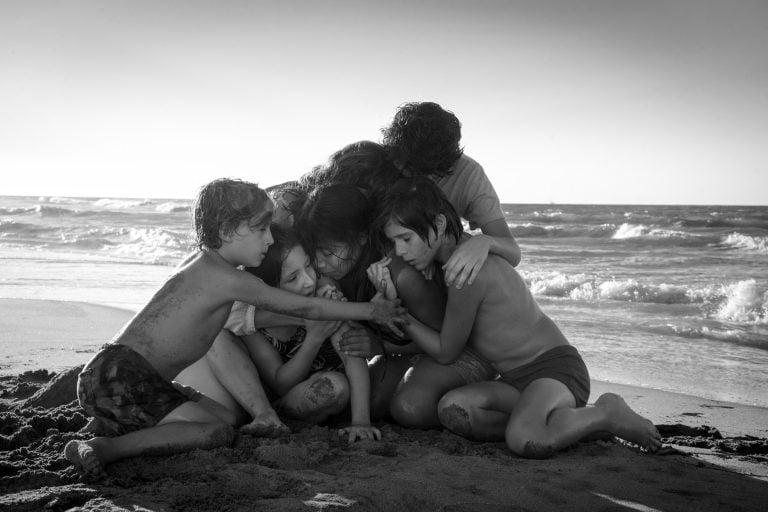
(L to R) Marco Graf as Pepe, Daniela Demesa as Sofi, Yalitza Aparicio as Cleo, Marina De Tavira as Sofia, Diego Cortina Autrey as Toño, Carlos Peralta Jacobson as Paco in Roma, written and directed by Alfonso Cuarón. (Carlos Somonte/Netflix)
Share
Oscar loves to make history. With Tuesday’s announcement of the Academy Award nominations, two unusual period pieces lead the pack with 10 nominations apiece: ROMA and The Favourite. Unconventional in utterly different ways, they are portraits of households at opposite ends of the spectrum. Alfonso Cuarón’s ROMA is a moving drama about a live-in maid in an upper-middle-class home in Mexico City during the early ’70s. The Favourite, directed by Yorgos Lanthimos, is a venomous satire set in England’s royal palace during the early 1700s. Both are stories are about the power of women, or the lack of it.
Cuarón’s black-and-white masterpiece is the heavyweight contender, and it’s poised to make history on several fronts. It brings Netflix, Hollywood’s Grand Disruptor, cannonballing into the Oscar pool as the frontrunner with its very first entry. Subtitled in Spanish and Mixtec, ROMA may also become the first foreign-language film to win Best Picture in the 91-year history of the Oscars. And for an Academy bent on improving diversity, it offers a refreshing challenge in the acting categories: first-time performers Yalitza Aparicio and Nancy García are honoured for lead and supporting roles respectively, and Aparcio becomes the first Indigenous woman ever nominated for Best Actress.
Three years after the #Oscarsowhite outrage, at a time when America is divided by issues of racism and xenophobia, the field of eight Best Picture nominees is remarkably diverse. Four are directed by white American men, but they include a civil rights morality tale (Green Book), the canonization of a gay rights champion (Bohemian Rhapsody) and a takedown of a Republican villain (Vice). Two are triumphantly African-American stories from Black directors, Spike Lee’s BlackKklansman and Ryan Coogler’s Black Panther, which becomes the first superhero movie ever nominated for Best Picture. And the two most nominated films were directed by Mexican and Greek directors. Gender is where the diversity breaks down. None of the Best Picture nominees was directed by a woman, and only three have female leads—Roma, The Favourite and A Star Is Born. But they’re also the top contenders.
The most glaring snub in the race is the Academy’s failure to nominate Bradley Cooper for his bravura feat as a first-time director with A Star Is Born. After his Golden Globes shutout, that seems cruel and unusual punishment for being absurdly talented. But bear in mind that directors nominate directors, and they may not appreciate seeing the movie’s producer and star having the nerve, and the greed, to also direct his passion project. The silver lining to this insult is that Cooper’s directing slot was filled by Poland’s Pawel Pawlikowski for the brilliant and beautiful Cold War—with ROMA, that means two of the five best directors made black-and-white, foreign-language films.
RELATED: In ‘First Man,’ an iconic space story is infused with powerful humanity
Other notable snubs are First Man and If Beale Street Could Talk, by Damian Chazelle and Barry Jenkins, who endured the Best Picture kerfuffle two years ago as the respective directors of La La Land (the mistaken winner) and Moonlight (the actual one). First Man’s epic story of the moon landing certainly deserved a nod, at least over Bohemian Rhapsody. But as a big-budget Hollywood movie, it committed the ultimate sin, by tanking at the box office while failing to unite the critics. If you can’t score a hit with a rocket ship movie starring Ryan Gosling as an American hero, something’s amiss at Mission Control—Gosling’s taciturn, somewhat Canadian take on Neil Armstrong’s character, no matter how accurate, probably didn’t help. As for Beale Street, Jenkins has created as much of a doting valentine to James Baldwin as an adaptation of his 1974 novel. Beale Street is brimming with so much virtue and affirmation that the drama gets lost in the romantic glow—with exception of Regina King, whose sharp-edged performance as the heroine’s formidable mother makes her a strong contender for Best Supporting Actress.
So what will win Best Picture? This year, it’s a horse race. Anything can happen. But here’s my take on the eight nominees, ranked according to their chances of winning:
1. ROMA
I’m going out on a wishful limb here, predicting that the movie that should win will win, something that’s unusual at the Oscars. But it is favoured over The Favourite. And there’s no question in my mind that it’s the year’s most exceptional film. It’s something we haven’t seen before: a miraculous mix of art-house intimacy and elevated spectacle, with a drama that gracefully expands from the upstairs-downstairs rituals of a bourgeois family to the martial arts manoeuvres of a right-wing populist militia, from Cleo the maid hanging laundry on a rooftop to her racing to give birth as riots erupt in the streets. Some dissenters have griped that Yalitza Aparicio’s heroine is too passive, but that’s the whole point. Cuarón has made an affectionate memoir about a servant from the only point of view he had, as a privileged boy in a broken home. Male auteurs typically begin their careers with boyhood memoirs, from Francois Truffaut (400 Blows) to Jean-Marc Vallée (Léolo). But this is Cuarón’s seventh feature, and with a Hollywood resumé that includes Children of Men, Gravity and the best of the Harry Potter movies, he returned home to make his most personal film with the craft, resources and creative freedom of a Hollywood auteur at the top of his game and his industry.
The crushing irony is that the year’s most exquisitely cinematic film was made by Netflix, the streaming titan that’s driving the audience out of theatres and onto the couch. Because Netflix made it so readily available, most Academy voters probably saw it on TV, which simply cannot sustain the spell of its slow panoramic visuals, or recreate its immersive 360-degree soundscape, the most revolutionary aspect of its production. Expecting the Academy to both reward and give its top prize to a B&W foreign-language film with an unknown cast once seemed crazy. Now that ROMA leads the race, it has to weather the backlash. But its victory would mark the kind of symbolic triumph for an Academy tortured by an identity crisis—an opportunity to honour world cinema, high art and Hollywood’s most successful Mexican filmmaker all at once. Also, Oscar worships gravitas, and as Trump’s Wall divides America, no film is more achingly resonant than this portrait of an Indigenous woman whose calm compassion prevails over hatred and chaos.
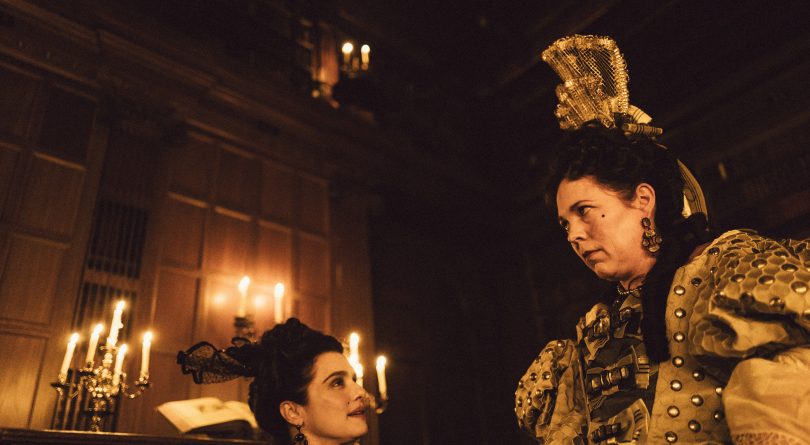
2. The Favourite
It’s the most delicious intrigue of court decadence and back-stabbing nobility since Dangerous Liaisons. But for what is essentially a confection, a compact yet opulent costume drama, The Favourite has a political spine. The fact that its ménage of three self-serving protagonists are all women, each played by a sublimely overqualified actor, puts this feminist-ish period farce oddly in sync with the #TimesUp era. While Roma serves as a dignified portrait of a noble servant who is essentially powerless, The Favourite is a portrait of grotesque nobility with a lesbian frisson. Expect Olivia Colman to win Best Actress—if only for her imminent feat of vaulting from her throne in this film as the addled Queen Anne to playing the next version of Queen Elizabeth II in The Crown. The Academy can never get enough of British royalty. And it’s diverting to see a snake pit of political power even more corrupt and childish than Trump’s White House. But costumes aside, The Favourite doesn’t look like a favourite for Best Picture. For all the fun and games, Lanthimos teases us with a tale of three women that messes with our desire to find a heroine, as he elicits, then obliterates, our empathy for its characters with perverse glee. And with rabbits running amok in the royal chambers, the proverbial “triumph of the human spirit”—Oscar’s signature cocktail—is nowhere to be found.
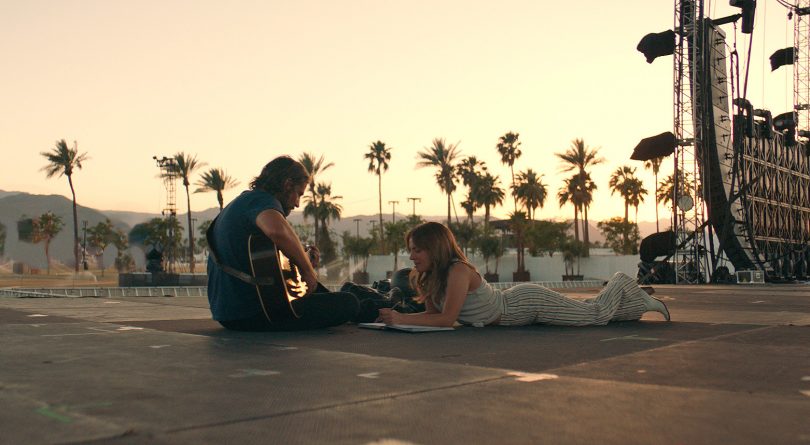
3. A Star Is Born
Let’s count the reasons it won’t win. First, the impossibly talented and handsome Bradley Cooper has pulled off such an unlikely tour de force that other artists may be too jealous to burnish his ego. Second, he’s been robbed of a directing nomination. Third, no amount of talent, his or Lady Gaga’s, can overcome the scripted limits of a sentimental yarn that’s showing its age after four iterations. And finally, at a time when there’s no escape from politics in America, this story of an ingenue leaving her boozing mentor in the stardust is the one Best Picture nominee utterly lacking in cultural consequence.
READ MORE: In conversation with Barbra Streisand: ‘Rage is a motivator’
On the plus side, having now plummeted from spoiled favourite to unfairly demoted underdog, A Star Is Born is primed for a comeback. And never underestimate Hollywood’s insatiable appetite for honouring movies about showbiz and its own mirrored legacy. The meta magic trick of the film’s own stars being reborn onscreen is irresistible. Lady Gaga (who will win Best Song) finesses her transformation from diva to actor like no one since Barbra Streisand. As a leading man who can direct and sing, Cooper serves her as a brilliant dance partner both in front of the camera and behind it. He’s proves he’s the heir apparent to Warren Beatty and Robert Redford, the movie star destined to direct. Finally, after the ludicrous upset at the Golden Globes, where his achievement was snubbed in favour of a real-life music fable that seemed infinitely more fake—the paint-by-numbers biopic of Bohemian Rhapsody—some poetic justice is in order.
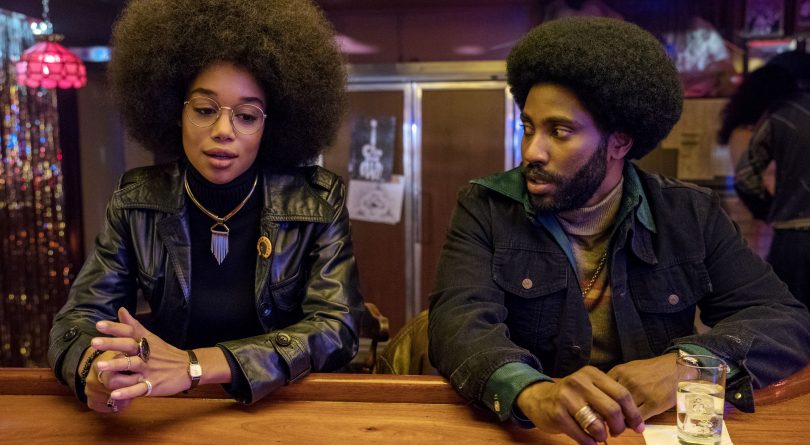
4. BlacKkKlansman
If ROMA didn’t exist, I’d be thrilled to see Spike Lee’s frontal assault on white supremacy win Best Picture. But I’d be surprised. The political rage and hyperbolic style of a Spike Lee joint runs counter to what the Academy deems “good taste.” Incredibly, after directing 20 features and creating his own sub-genre—a deep and singular niche in the canon of American cinema—Lee has never scored a Best Picture nomination until now. Gloriously ambitious and imperfect, this is one of his most powerful pictures—a hot mess of history, sermon, satire, mock blaxploitation, earnest melodrama and harrowing requiem. No film last year was more timely. With its shocking coda of footage of 2017’s car-ramming murder in Charlottesville, it confronted the atrocity of born-again racism in Trump’s America head-on. Yet even as an odd-couple comedy, BlacKkKlansman is more fun than Green Book. Adam Driver nails his precarious role as undercover cop posing as an outrageous bigot. And John David Washington brings buoyant swagger to the role of his partner Ron Stallworth, who adopts a “white voice” to infiltrate the Ku Klux Klan by phone. The fact that he’s one of two Black protagonists to adopt a white voice this year, along with the upwardly mobile telemarketer in Boots Riley’s Sorry to Bother You, suggests Lee has a hotline to the zeitgeist, and just maybe the Oscar.
READ MORE: Spike Lee’s anti-Trump masterpiece: ‘This film is a wake-up call’
5. Green Book
This is the sort of broadly amusing, well-acted, inspirational crowd-pleaser-based-on-a-true-story that often used to sneak past the heavyweight contenders. Green Book bolted out of the gate at the Toronto International Film Festival, where it won the People’s Choice Award, often a precursor to Best Picture. Since then, however, it has been looking a bit green around the gills. After going to so much trouble to gain weight and talk like an Italian-American gangster, Viggo Mortensen upstaged his impeccable performance by uttering the n-word on a panel. Then a 2015 tweet resurfaced from the film’s co-writer Vince Vallelonga supporting Donald Trump’s claim that Muslim people in New Jersey cheered the 9/11 attack on the World Trade Centre. Apologies were made, but the film’s liberal charm offensive seems too retro for its own good. As a role-reversed Driving Miss Daisy—with a white saviour chauffeuring an erudite black jazz musician through the Deep South—Green Book became an easy target. In a year when you have a pair of Best Picture nominees driven by Black directors and Black protagonists, giving the big prize to a civil rights comedy that relegates its man of colour to a supporting role would be awkward, to say the least. But not unthinkable.
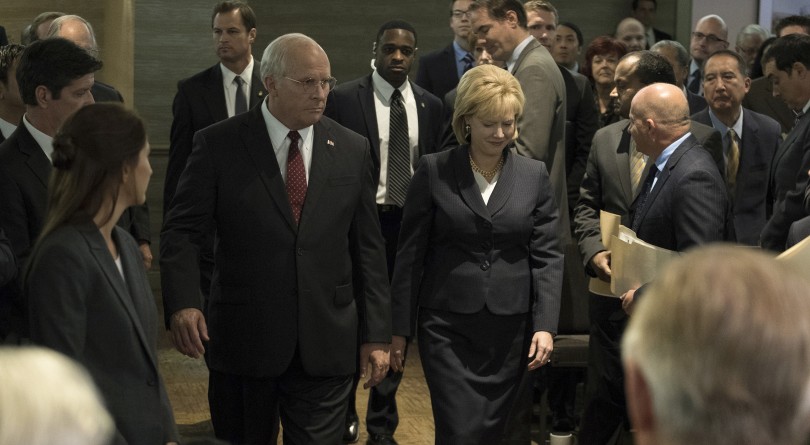
6. Vice
By the same token, despite its eight nominations, I can’t see Vice taking Best Picture with a story of a man without a heart. For his uncanny portrayal of former U.S. vice-president and Machiavellian puppet master Dick Cheney, Christian Bale should and probably will win Best Actor. That he manages to remain compelling and credible playing a moral and emotional cipher under a ton of flab and latex makes his performance that much more astonishing. This is the kind of movie one expects Oliver Stone would have made, and turned into melodrama. Director Adam McKay goes through the motions of making a biopic, but he has the same problem as his protagonist: his heart’s not in it. Stuck with a character who doesn’t have an operatic bone in his body, McKay overthinks the job and paints himself into a corner. He’s the first to admit, even in the movie, that Cheney’s inner life is an enigma he has failed to crack. With Amy Adams as Cheney’s stoical wife, Steve Carell as a cavalier Donald Rumsfeld, and Sam Rockwell as eternal frat boy George W. Bush, the supporting cast is admirable enough, but it’s like watching a volley of unusually sharp SNL impersonations. There’s an almost animatronic verisimilitude to the characters. Meanwhile, McKay persists in rapping on the fourth wall, dishing the kind of tart asides that made The Big Short a treat, but here come across as an admission of defeat. Vice is the tale of an amoral fixer who changed American politics by being the smartest guy in the room. When the director tries to show he’s smarter, he ends up being too clever by half. Still, in this anything-goes race, a Best Picture vote for Vice could serve as a surrogate target of anger against Trump.
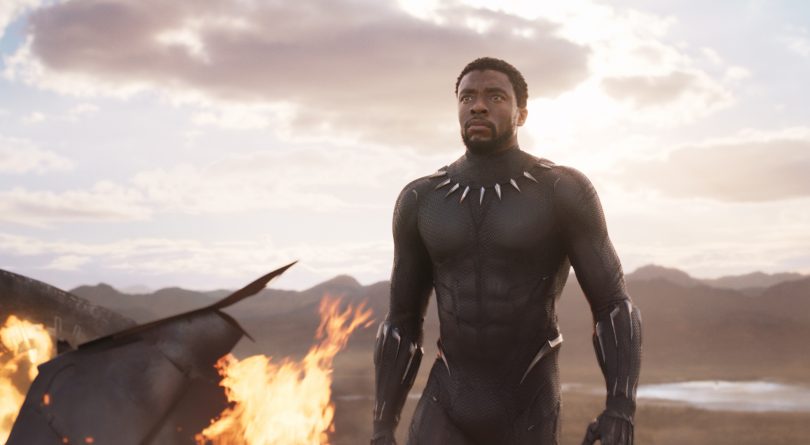
7. Black Panther
A landmark of African American cinema, Black Panther was both critically acclaimed and last year’s top-grossing movie. It has more than earned its seven nominations, including its ground-breaking Best Picture nod. But that’s likely as far as it goes. With Ryan Coogler shut out of the directing category and not a single acting nomination, its chances are slim. And between the two African-American movies vying for Best Picture, BlacKkKlansman should prevail. But there’s more than identity politics at play. Despite the fact that comic book blockbusters dominate Hollywood’s economy, and perhaps because of it, they sit at the bottom of its artistic caste system, even below rom-coms. None has ever won Best Picture. Even outside the genre, The Lord of the Rings: Return of the King was the last franchise blockbuster to win the big prize, and that was 15 years ago. On the other hand, it’s worth repeating that the Academy loves to make history as much as it loves royalty, and this is a historic American movie about African royalty. Unlike BlackKklansman (and any movie by Spike Lee), it’s free of controversy. And in the Academy’s struggle to erase the #oscarsowhite stigma, a Black Panther win would have a salubrious effect.
8. Bohemian Rhapsody
No one seemed more shocked by Bohemian Rhapsody’s upset at the Golden Globes than its star and its filmmakers—a reminder that the celebrity-sucking junketeers of the Hollywood Foreign Press Association represent no one (not even themselves, since they don’t allow a foreign-language film like Roma to even qualify for a best picture award). The Globes party and this nomination end Bohemian Rhapsody’s winning streak. But to cite another unwritten Oscar rule, the Academy worships iconic real-life heroes more than fictional ones. (If Lady Gaga had played someone famous and dead in A Star Is Born, there would be no contest.) Rami Malek has a clear shot at winning Best Actor. But as a piece of filmmaking, Bohemian Rhapsody is just an impressive stunt. It follows a classic formula—boy meets band, boy loses band, boy gets band back. And the contrived scenes of the musicians make This Is Spinal Tap look like gritty neo-realism. Still, the film was a massive hit at the box office. And Queen’s Freddie Mercury, who can hold his own with any British royal, cries out for a coronation. Factor in his flamboyant triumph of the human spirit, as an AIDS martyr staging his last hurrah in the Live-Aid concert for famine relief . . . well, do the math. Stranger things have happened than Bohemian Rhapsody hitting a high note with Best Picture.